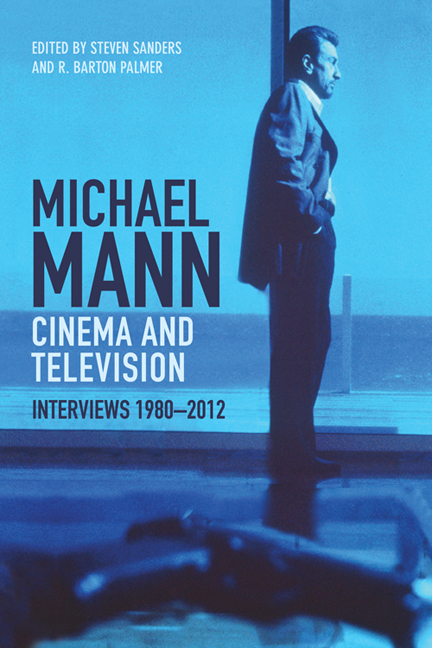Book contents
- Frontmatter
- Contents
- List of Illustrations
- Acknowledgements
- Introduction: Michael Mann in His Interviews
- 1 Four Minute Mile
- 2 Castle Keep
- 3 Of Vice and Mann
- 4 Manhunter: An Interview with Michael Mann
- 5 Michael Mann: Hollywood Writer–Director–Producer
- 6 Mann and His Movies
- 7 All the Corporations’ Men
- 8 Smoking Gun
- 9 “Ali Likes the Film a Lot. He's Seen it Six Times”
- 10 Paint it Black
- 11 Mann Among Men
- 12 L.A. Belongs to the Coyotes
- 13 Michael Mann Interview
- 14 A Mann's Man's World
- 15 Number One with a Bullet
- 16 The Study of Mann
- Chronology
- Filmography
- Publisher's Acknowledgments
- Index
12 - L.A. Belongs to the Coyotes
Published online by Cambridge University Press: 05 September 2016
- Frontmatter
- Contents
- List of Illustrations
- Acknowledgements
- Introduction: Michael Mann in His Interviews
- 1 Four Minute Mile
- 2 Castle Keep
- 3 Of Vice and Mann
- 4 Manhunter: An Interview with Michael Mann
- 5 Michael Mann: Hollywood Writer–Director–Producer
- 6 Mann and His Movies
- 7 All the Corporations’ Men
- 8 Smoking Gun
- 9 “Ali Likes the Film a Lot. He's Seen it Six Times”
- 10 Paint it Black
- 11 Mann Among Men
- 12 L.A. Belongs to the Coyotes
- 13 Michael Mann Interview
- 14 A Mann's Man's World
- 15 Number One with a Bullet
- 16 The Study of Mann
- Chronology
- Filmography
- Publisher's Acknowledgments
- Index
Summary
Thriller director Michael Mann is rumored to be a perfectionist among Hollywood's filmmakers. He talked to SPIEGEL ONLINE about Collateral, star Tom Cruise, and censorship issues raised about Hollywood by Christian fundamentalists.
SPIEGEL ONLINE: Mr. Mann, why are you so obsessed with tragic stories about men?
Michael Mann: Hard to say. I'm fascinated by the challenges of life and all of the contradictions involved. I'm especially interested in people who present themselves as clear-headed and self-confident. For example, at the beginning of Collateral, contract killer Vincent has a consistent, rational view of himself and the world he lives in. He feels absolutely justified in what he does. He's a nihilist, thoroughly convinced that the universe is fundamentally meaningless. What happens is not his concern. Time and space will continue to exist, no matter what. Vincent has internalized this philosophy of life. But at the end of the movie, he contradicts himself when he asks the taxi driver: “Will anybody notice that I was here once?” In other words, he wants to know whether his life had any meaning at all.
SPIEGEL ONLINE: What about Max, the black cabbie Vincent forces to accompany him on his murderous journey?
Mann: Max finds himself unable to respond to any sudden urge, to let himself go. If there's something that calls for him to react, he balks, he hesitates, and he stifles whatever initial impulse he has. There's nothing more dramatic than quite divergent characters who are thrown into a situation where conflict then arises, forcing them to act, and this is why I'm particularly drawn to stories of this kind. Sociopaths are a phenomenon I find particularly fascinating, especially how such people deal with the real world, even as they also withdraw from it.
SPIEGEL ONLINE: The film's also a topographical study. Cinematically, which city appeals to you more, New York or Los Angeles?
Mann: The original script for Collateral was conceived with New York in mind, and it was quite different in other ways as well. It involved the Russian mafia, and the character Max wasn't Afro-American. At its core, the original story was much too clichéd. So we made radical changes. When I met Jamie Foxx, I was sure he was the only one who could plausibly embody Max.
- Type
- Chapter
- Information
- Michael Mann - Cinema and TelevisionInterviews, 1980-2012, pp. 91 - 94Publisher: Edinburgh University PressPrint publication year: 2014



